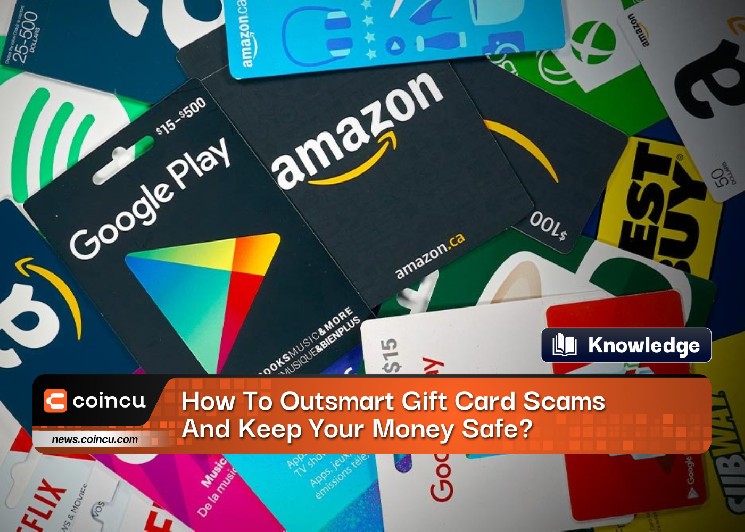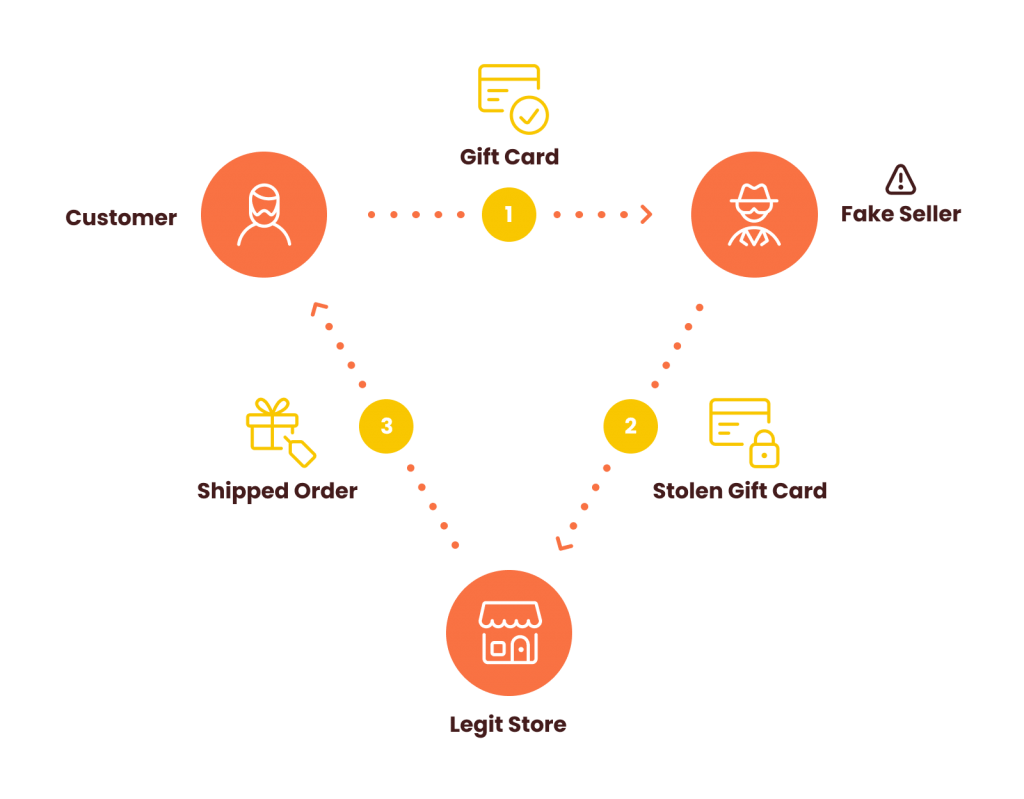How To Outsmart Gift Card Scams And Keep Your Money Safe?

What are gift card scams?
Gift card scams are fraudulent activities that involve using gift cards to obtain money or personal information from unsuspecting individuals. There are several types of gift card scams, including:
- Activation scams: Scammers will offer to activate a gift card for you for a fee, but the card is actually invalid or has already been used.
- Phishing scams: Scammers will send emails or text messages that appear to be from a legitimate retailer or gift card issuer, asking you to provide personal information or click on a link to claim a gift card.
- Impersonation scams: Scammers will pose as a customer service representative or government official and ask for payment using gift cards to resolve a problem, such as a supposed tax debt.
- Refund scams: Scammers will claim to be able to offer you a refund for a product or service using a gift card, but the card is either invalid or has already been used.
- Sweepstakes scams: Scammers will claim that you have won a gift card in a sweepstakes or lottery, but you must pay a fee to claim the prize.
Gift card scams can be difficult to detect, as scammers will often use sophisticated techniques to make their scams appear legitimate. It’s important to be cautious when receiving unsolicited emails or text messages and to only purchase gift cards from reputable retailers or vendors. If you suspect that you have been a victim of a gift card scam, contact the retailer or gift card issuer immediately to report the fraud and seek assistance.
How do gift card scams work?
Gift card scams work by tricking unsuspecting individuals into giving away their money or personal information. Here are some examples of how gift card scams work:
- Activation scams: Scammers will offer to activate a gift card for you for a fee, but the card is actually invalid or has already been used. They will often advertise these services on social media platforms or online marketplaces, and may ask for payment using methods such as wire transfers or cryptocurrency. Once they receive payment, they will disappear and leave you with a worthless gift card.
- Phishing scams: Scammers will send emails or text messages that appear to be from a legitimate retailer or gift card issuer, asking you to provide personal information or click on a link to claim a gift card. These messages may contain links to fake websites that look like the real thing, but are designed to steal your personal information. Once the scammers have your information, they can use it for identity theft or to steal your money.
- Impersonation scams: Scammers will pose as a customer service representative or government official and ask for payment using gift cards to resolve a problem, such as a supposed tax debt. They may even threaten legal action or arrest if you don’t comply. Once you provide the gift card information, the scammers will use it to access the funds and disappear.
- Refund scams: Scammers will claim to be able to offer you a refund for a product or service using a gift card, but the card is either invalid or has already been used. They may ask you to purchase a gift card and provide the information to them in order to receive the refund. Once they have the gift card information, they will use it to access the funds and disappear.
- Sweepstakes scams: Scammers will claim that you have won a gift card in a sweepstakes or lottery, but you must pay a fee to claim the prize. They may ask you to purchase a gift card and provide the information to them in order to claim the prize. Once they have the gift card information, they will use it to access the funds and disappear.
Gift card scams can be difficult to detect, as scammers will often use sophisticated techniques to make their scams appear legitimate. It’s important to be cautious when receiving unsolicited emails or text messages and to only purchase gift cards from reputable retailers or vendors. If you suspect that you have been a victim of a gift card scam, contact the retailer or gift card issuer immediately to report the fraud and seek assistance.
What are the signs of a gift card scam?

There are several signs of a gift card scam that you should be aware of in order to protect yourself from fraud:
- Unsolicited offers: If you receive an unsolicited email, text message, or social media message offering you a gift card, be wary. Scammers often send out mass messages hoping to catch someone who will fall for their scam.
- Urgency: Scammers will often use urgent language in their messages, such as “Act now!” or “Limited time offer!” to create a sense of urgency and pressure you to act quickly.
- Requests for personal information: Legitimate retailers and gift card issuers will not ask you to provide personal information, such as your Social Security number or bank account details, in order to claim a gift card. If a message asks for this type of information, it is likely a scam.
- Unusual payment methods: Scammers often ask for payment using unusual methods, such as wire transfers or cryptocurrency, that are difficult to trace and recover if you are scammed.
- High-value offers: Scammers may offer high-value gift cards or other prizes to entice you to participate in their scams. If an offer seems too good to be true, it probably is.
- Typos and grammatical errors: Scammers often make mistakes in their messages, such as typos or grammatical errors, that indicate the message is not from a legitimate source.
If you notice any of these signs, it is likely that you are being targeted by a gift card scam. It’s important to be cautious and take the time to verify the legitimacy of any offers or messages you receive before taking any action.
How can you avoid gift card scams?

Gift card scams can be a common way for scammers to steal your money, so it’s important to be aware of the signs and take precautions to avoid them. Here are some tips to help you avoid gift card scams:
- Buy gift cards from reputable sources: Stick to buying gift cards from well-known retailers, rather than buying them from third-party sellers or individuals you don’t know. This will help ensure that the gift card is legitimate and hasn’t been tampered with.
- Be wary of unsolicited calls or emails: If someone contacts you out of the blue and asks you to buy a gift card, it’s likely a scam. Scammers often pose as representatives from government agencies, utility companies, or tech support, and ask you to buy gift cards as a form of payment.
- Never share gift card details: Never give out the gift card number, PIN, or other details to someone you don’t know or trust. Once a scammer has this information, they can use the gift card to make purchases or steal your money.
- Check the packaging: Before you buy a gift card, check the packaging to make sure it hasn’t been tampered with. Look for any signs of damage or signs that the PIN may have been scratched off and replaced.
- Use gift cards as soon as possible: Don’t wait too long to use your gift card, as scammers can steal the funds if they have the card details. Try to use the gift card as soon as possible after you receive it.
By following these tips, you can help protect yourself from gift card scams and keep your money safe.
What should you do if you fall victim to a gift card scam?
If you believe you have fallen victim to a gift card scam, there are several steps you should take:
- Contact the retailer: If you purchased the gift card from a legitimate retailer, contact their customer service department and explain the situation. They may be able to cancel the gift card or refund your money.
- Report the scam: You should report the scam to the Federal Trade Commission (FTC) at ftc.gov/complaint. This can help the authorities track down the scammers and prevent others from falling victim to the same scam.
- Contact your bank or credit card company: If you paid for the gift card with a credit card, contact your credit card company and report the scam. They may be able to reverse the charges and issue you a refund.
- Change your passwords: If you shared any personal information with the scammers, such as login credentials or bank account information, change your passwords and monitor your accounts for any suspicious activity.
- Educate yourself: Learn more about how gift card scams work and how to avoid them in the future. The more you know, the better equipped you will be to protect yourself from scams in the future.
Remember, falling victim to a scam is never your fault. It’s important to take action quickly to minimize the damage and prevent further harm.
DISCLAIMER: The Information on this website is provided as general market commentary and does not constitute investment advice. We encourage you to do your own research before investing.






 Bitcoin
Bitcoin  Ethereum
Ethereum  Tether
Tether  USDC
USDC  TRON
TRON  Dogecoin
Dogecoin  Cardano
Cardano  Bitcoin Cash
Bitcoin Cash  Chainlink
Chainlink  Monero
Monero  LEO Token
LEO Token  Stellar
Stellar  Zcash
Zcash  Litecoin
Litecoin  Hedera
Hedera  Dai
Dai  Cronos
Cronos  OKB
OKB  Tether Gold
Tether Gold  Ethereum Classic
Ethereum Classic  KuCoin
KuCoin  Cosmos Hub
Cosmos Hub  Gate
Gate  Algorand
Algorand  VeChain
VeChain  Stacks
Stacks  Tezos
Tezos  TrueUSD
TrueUSD  Dash
Dash  IOTA
IOTA  Basic Attention
Basic Attention  Theta Network
Theta Network  NEO
NEO  Decred
Decred  Synthetix
Synthetix  Qtum
Qtum  Ravencoin
Ravencoin  0x Protocol
0x Protocol  DigiByte
DigiByte  Zilliqa
Zilliqa  Nano
Nano  Holo
Holo  Siacoin
Siacoin  Numeraire
Numeraire  Waves
Waves  Status
Status  Ontology
Ontology  Enjin Coin
Enjin Coin  Hive
Hive  BUSD
BUSD  Pax Dollar
Pax Dollar  Lisk
Lisk  Steem
Steem  Huobi
Huobi  OMG Network
OMG Network  NEM
NEM  Bitcoin Gold
Bitcoin Gold  Augur
Augur  Bitcoin Diamond
Bitcoin Diamond